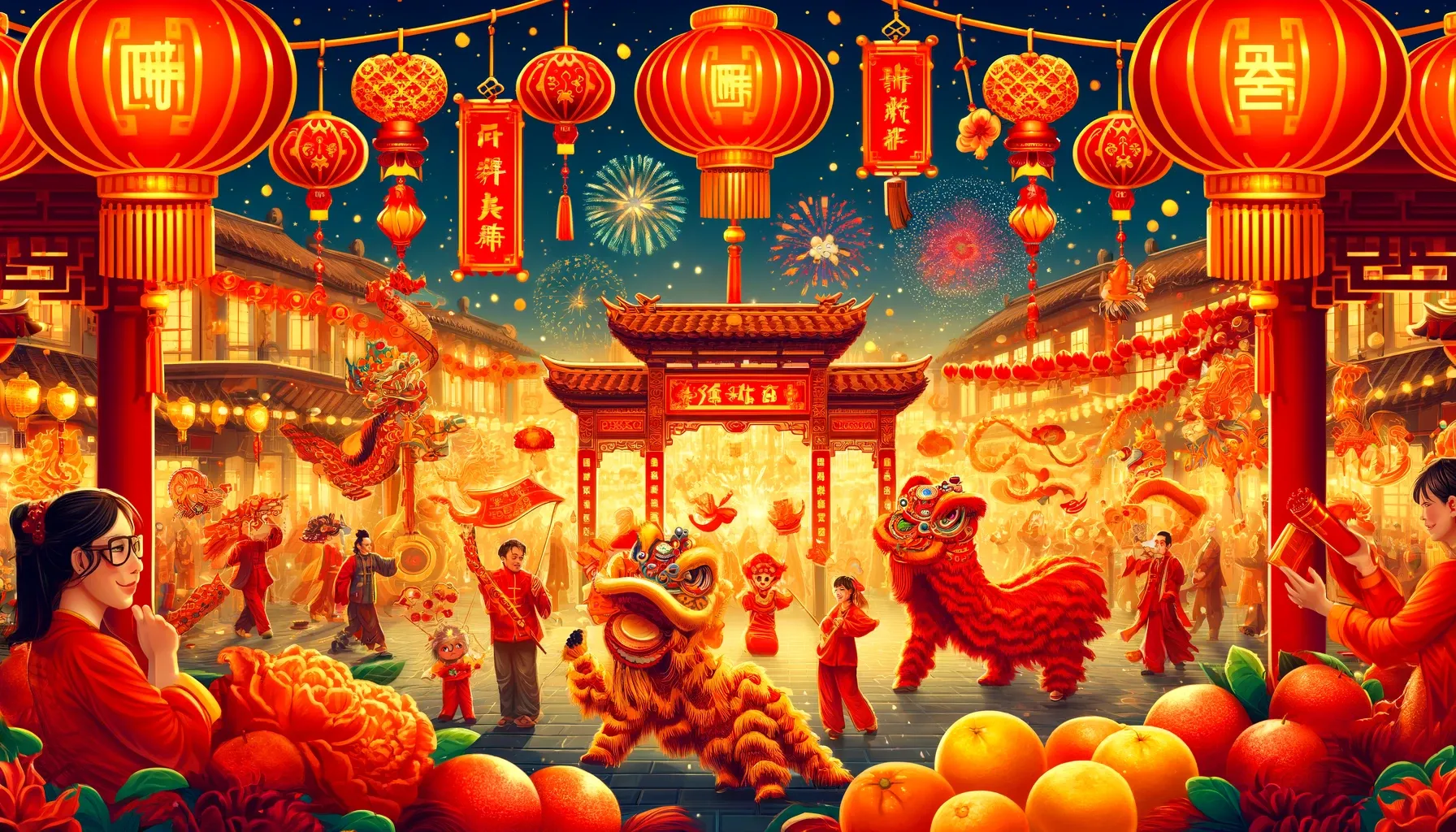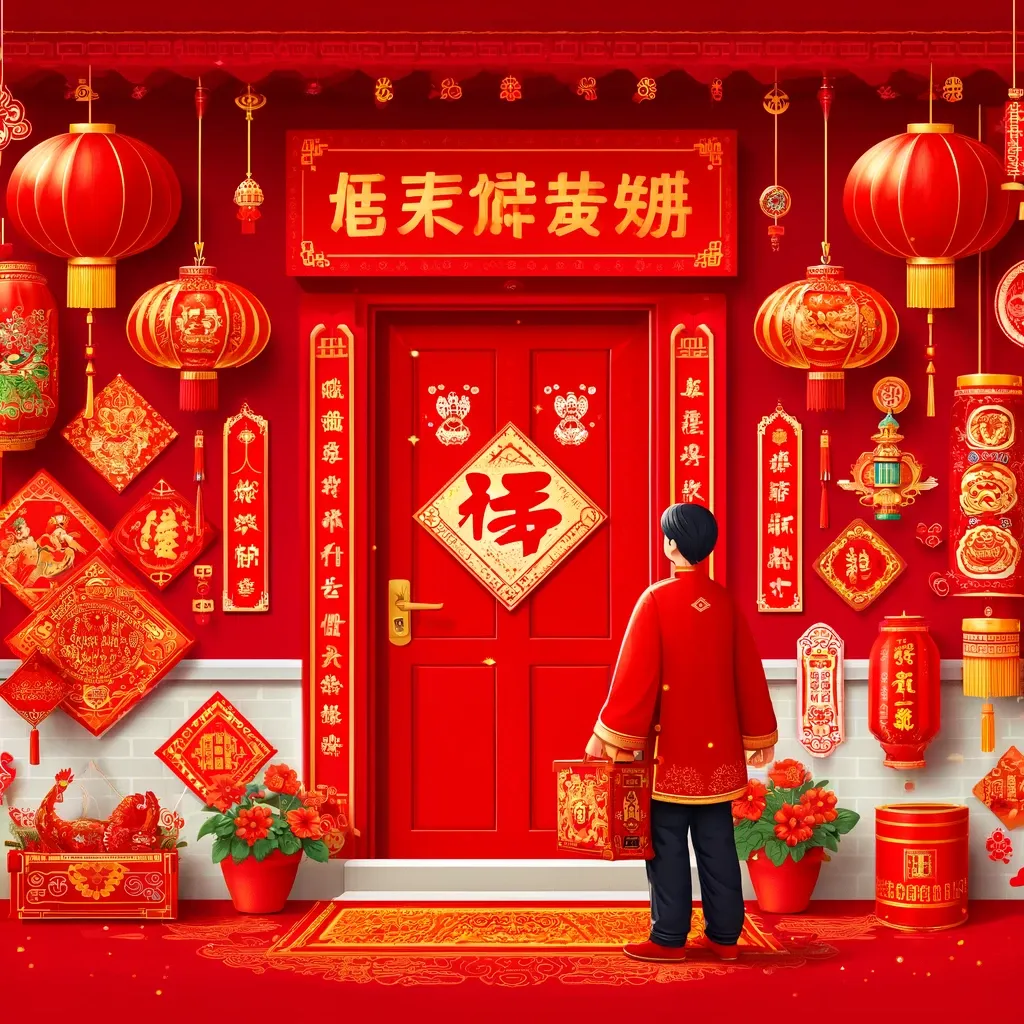Preparation for the celebration of the Chinese New Year

- Learn more about Chinese New Year and its traditions
- Green wooden dragon: symbol of the Chinese New Year
- Traditions and customs of the Chinese New Year
- Taboos and traditions during the Chinese New Year
The Chinese New Year is an amazing holiday that is worth adding to your schedule to continue the New Year celebrations.
Taking 20% of the world's population as an example, we can see that a lot of people celebrate this holiday in China. So, let's learn more about Chinese New Year and its traditions.
Traditions and symbolism
We previously compiled a list of the most amazing New Year traditions from different countries, but the Chinese celebrate this holiday in their own way. The Chinese New Year, also known as the Lunar New Year or the New Year according to the lunar calendar, will be celebrated on February 10, 2024. In China, this holiday is celebrated similarly to other countries: with the exchange of greetings and gifts. They say "Happy New Year" in Chinese.
The Chinese New Year has many customs and attributes that make the celebration even more special. The most well-known symbol for the year 2024 is the Green Wooden Dragon. This symbol is considered lucky and will bring good fortune to anyone who associates it with themselves.
Features of the holiday
One of the important aspects of the Chinese New Year is food. During this holiday, people prepare and consume special dishes that are considered symbols of luck and prosperity. Some of these include chicken, duck, fish, dumplings made with boiled wheat, and nuggets.
The Chinese New Year is also known for its traditional gifts. One of the most popular gifts is red envelopes filled with money. They symbolize luck and prosperity for the recipient.
Frequently Asked Questions
As for the most frequently asked questions about the Chinese New Year, we have gathered some of them in the FAQ section for you. If you have any questions, feel free to ask.
History and traditions
The Chinese New Year has a rich history, dating back to 2968 BC when the great ruler Huang Di led the country. At that time, the celebration was associated with the harvest and worship of the gods. Today, this holiday is primarily a family occasion, and everyone travels to be with their loved ones to welcome the New Year together.
The Chinese also celebrate the regular New Year according to the Gregorian calendar, but in a modest form. The main holiday for them is the Lunar New Year or Spring Festival (Chunjie), which comes at the end of January-February. According to legend, on this day Nian, a huge monster with a long horned head, appears from the sea and devours all the people's supplies. In the past, the Chinese used to flee from villages by the sea and hide in caves from its arrival.
Conclusion
The Chinese New Year is a special holiday that combines history, customs, and symbolism. By exploring the culture and traditions of China, one can enrich their experience and festive spirit. So why not include the Chinese New Year in your schedule and continue the celebration?
This continued until an elderly man invented various charms against the monster: he began to stick red papers on all the doors, burned bamboo, and dressed in red clothing. The nanny was frightened by these attributes and never appeared again. Therefore, these traditions are still observed by the Chinese to this day.
The Chinese New Year is determined each year by the lunar calendar, and the date of its celebration changes annually. The first day of the new year always falls on the new moon between January 21 and February 20. In 2024, the Chinese New Year will be on February 10, and it will be celebrated for 15 days until February 24. This holiday is the longest in East Asian countries and has its own significance and tasks for each day. A detailed calendar with dates and events can be found here.
Is it worth moving to China? Personal experience of immigration, life, and doing business in China.
Chinese New Year: "totem" animals.
Each new year in the Chinese calendar is associated with a specific animal symbol. There are 12 animals in the eastern horoscope, namely: Rat, Bull, Tiger, Rabbit, Dragon, Snake, Horse, Goat, Monkey, Rooster, Dog, and Pig. Since this cycle repeats every 12 years, it's easy to determine if this is your year, just check to see if your age is divisible by 12 without a remainder. The colors and elements also change: yellow, white, green, red; earth, metal, water, wood, fire. Each combination of symbol, element and color in the horoscope repeats once every 60 years.
As for the "totem" animal of the year 2024, it will be the green wooden dragon. In Chinese culture, it symbolizes wisdom and generosity. According to forecasts, this is expected to be a year when long-standing conflicts and issues are resolved.
Lucky symbols associated with the green wooden dragon:
- The dragon itself is the most auspicious symbol in Chinese culture and is said to bring luck, power, and wealth.
- A figurine or painting of a dragon can become a powerful symbol of luck for those born in the Year of the Dragon.

Coloring green
Wearing green clothing and accessories, as well as adding green accents to your home decor, can attract positive energy and good luck.
In Chinese culture, the number 7 is associated with happiness and is linked to the dragon. Wearing a talisman or amulet featuring the lucky number seven can attract good fortune.
The jade plant, also known as the money tree, symbolizes wealth and prosperity.
Chinese New Year
Chinese New Year is associated with many traditions and customs. The holiday begins with the mass launching of fireworks and lighting of incense, the louder the better.
Traditional customs
On New Year's Eve, many people gather to pray for happiness and good fortune at the Longhua Temple located in Shanghai. To avoid encountering Nian (the monster), it is recommended to place something tasty at the doorstep. Additionally, Nian is afraid of the color red, which is why it is widely used during these days.
It’s hard to imagine the Chinese New Year without the traditional family dinner, which is also known as the reunion dinner. Dancing lion and dragon figures appear on the streets, symbolizing the joy of the Spring Festival. Temple fairs held during this time are also extremely popular.
Chinese New Year: traditions and rituals
On the eve of the holiday, it is recommended to wear new clothes, and the underwear should be red. It is also advised to clean the house before the New Year to get rid of unnecessary things and negative energy. Decorating the home with blooming flowers symbolizes rebirth, abundance, and professional growth. Instead of a Christmas tree, in China, a money tree is used. For this, rice is placed in a deep pot, and branches of the tree are arranged, to which ancient copper coins are tied.
New Year's gala concert and the protection of the Year
In anticipation of the holiday, it is customary in China to watch the New Year's gala concert on CCTV. The show starts at 8:00 PM and lasts until midnight. In recent years, live broadcasts have also become available on YouTube. After dinner, people usually stay awake to not miss out on future luck. This tradition is called "Guarding the Year."
Restrictions during the Chinese New Year
During Chinese New Year, there are a few taboos that should not be broken. Washing should be avoided on New Year's Eve so as not to wash away all your luck. You should also avoid getting a haircut, as this can rob you of some of your prosperity. It is important not to utter negative words so as not to bring misfortune upon yourself and your loved ones. Breaking dishes is also not recommended as it can reduce your chances of prosperity and good fortune. Chinese New Year celebrations involve cleaning, but you should avoid doing so as it can take away your luck. It is advisable to avoid using scissors and sharp objects as they can hinder the flow of wealth and success. Also, taking loans and getting into debt should be avoided. To avoid getting sick throughout the year, it is better to avoid taking medicines and visiting a doctor, except for chronic and serious illnesses. It is important not to quarrel and cry, but to solve all issues peacefully, so that the new year passes in the same way.
Festive table and traditional dishes
When it comes to the festive table during the Chinese New Year, it should be abundant to ensure that wealth and good fortune accompany you throughout the coming year. Although different regions of China have their own customs, there are several common dishes that can be found on every table, such as stuffed rolls, dumplings, longevity noodles, steamed fish, and steamed chicken. A popular dish is "nian gao" or "rice cake." During the New Year celebrations, wine is a popular drink that is recommended for all family members to drink, as it is believed to protect against misfortunes. While tea is a popular beverage in China, it takes a back seat during the Chinese New Year.
Traditions of gift-giving during the Chinese New Year
In China, it is customary to give red envelopes filled with money for the New Year. These envelopes are called "hongbao" and are always red. The amount of money should be even. In addition to the monetary gift, it is also common to give mandarins or oranges.
Conclusion
In this article, I talked about the Chinese New Year, an exciting holiday that should be added to your celebration schedule. I shared the history of this holiday, from its beginnings in ancient times to the present day, where it has become more of a family event. The Chinese New Year, according to the lunar calendar, begins each year at the end of January or the beginning of February, and it is the longest holiday in East Asian countries. Along with this, I discussed the traditions and customs of the Chinese New Year, such as setting off fireworks, lighting incense, visiting the Longhua Temple to pray for happiness and good fortune, and attracting positive energy through the color red, which symbolizes luck. Gifts in the form of red envelopes with money and mandarins are also an important part of this holiday. I also described the main dishes served at the New Year's table, such as stuffed rolls, dumplings, longevity noodles, and fish, as well as drinks like wine, which are an integral part of the festive feast. The holiday comes with traditions that must be observed, such as refraining from washing, cutting hair, and cleaning to avoid washing away good luck. It is also not recommended to break dishes or use sharp objects, as they may reduce the chances of prosperity and good fortune. The Chinese New Year is a bright and joyful event that is worth adding to your celebration calendar. It is a time for gatherings with family, friends, and loved ones, for fulfilling wishes and hopes, as well as for attracting luck and positive energy for the coming year. The celebration of the Chinese New Year leaves memories that are etched in hearts and souls, continuing to bring joy throughout the year.
Comment
Popular Posts
9 October 2024
272
9 October 2024
2068
Popular Offers




Subscribe to the newsletter from Hatamatata.com!
Subscribe to the newsletter from Hatamatata.com!
I agree to the processing of personal data and confidentiality rules of Hatamatata


